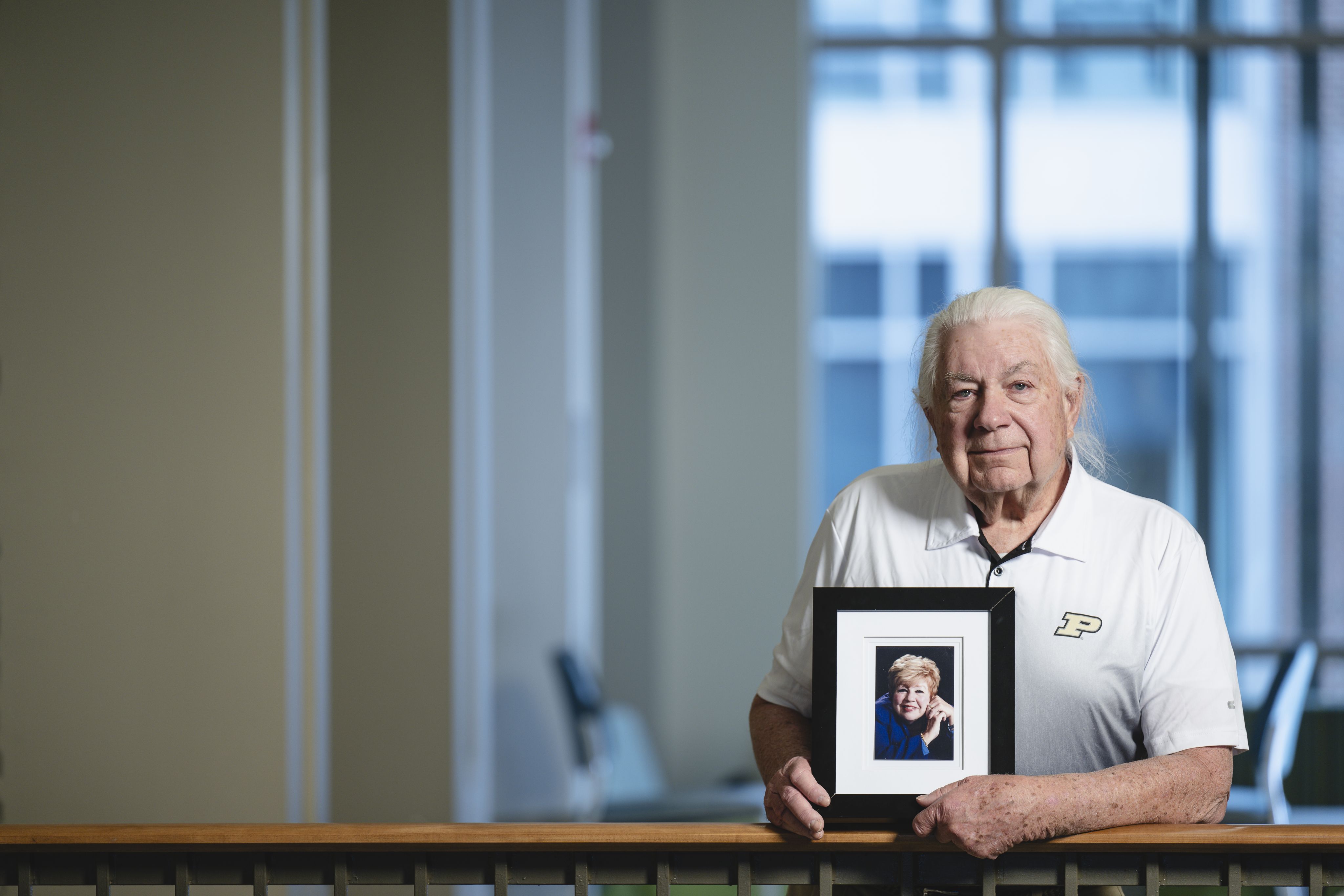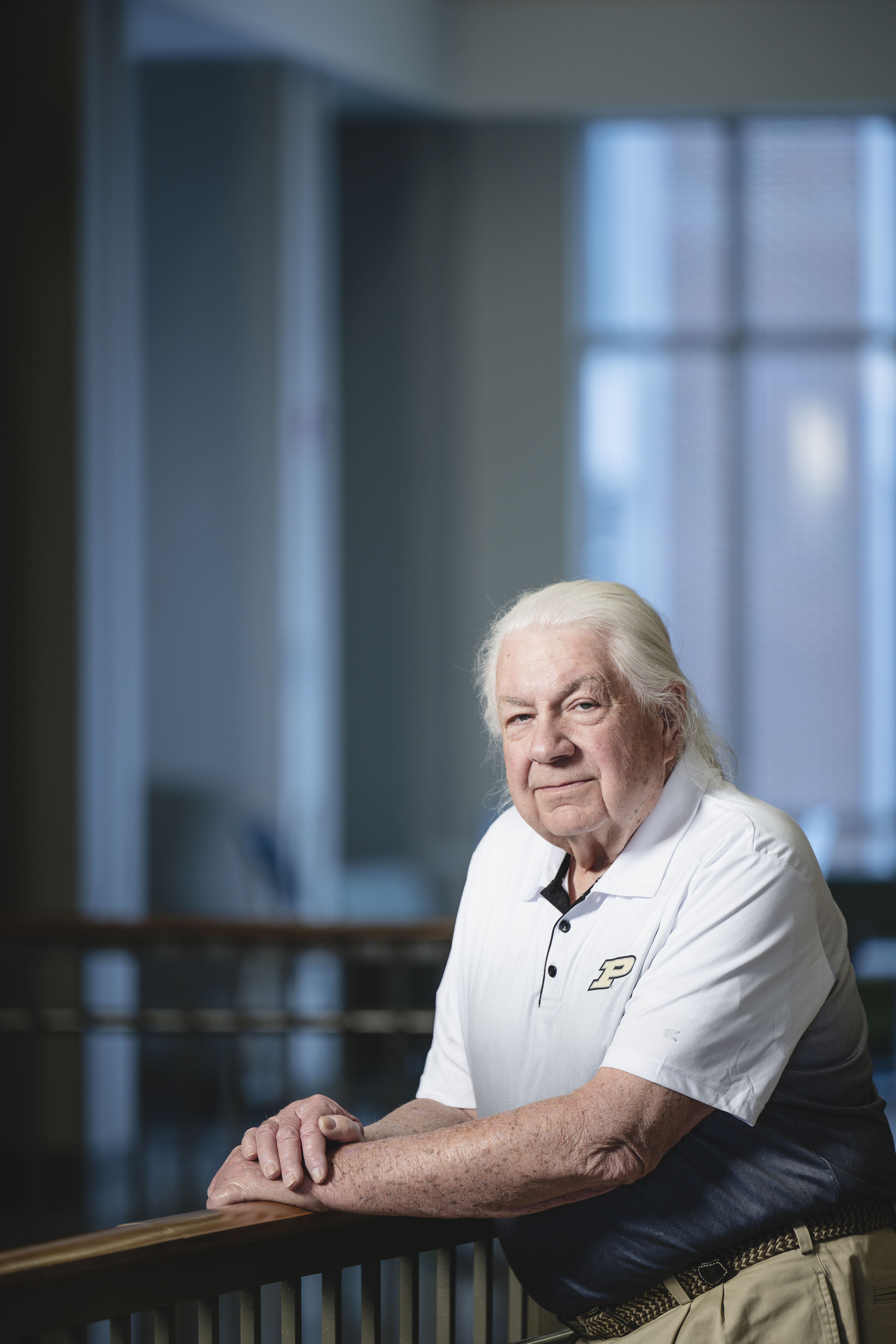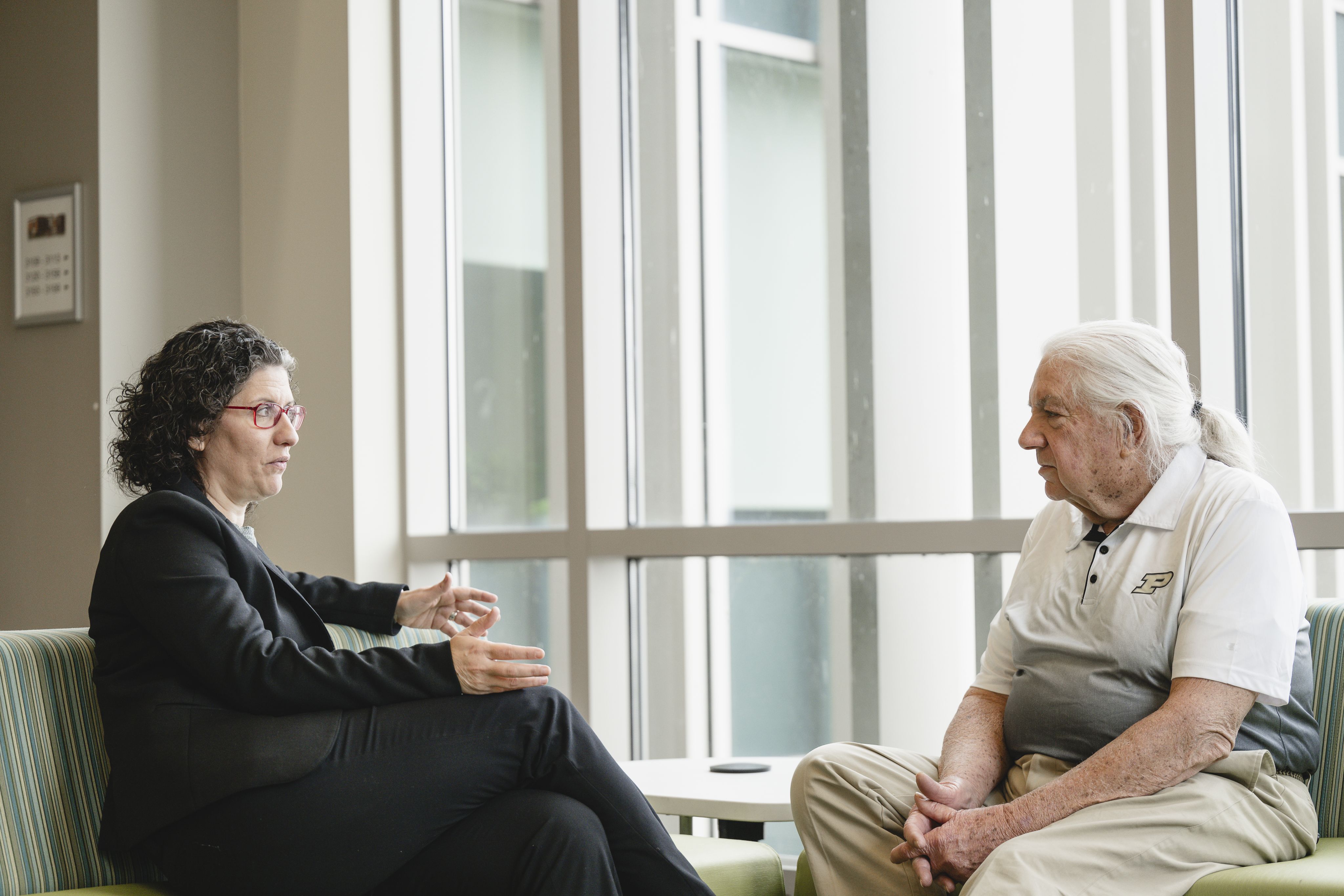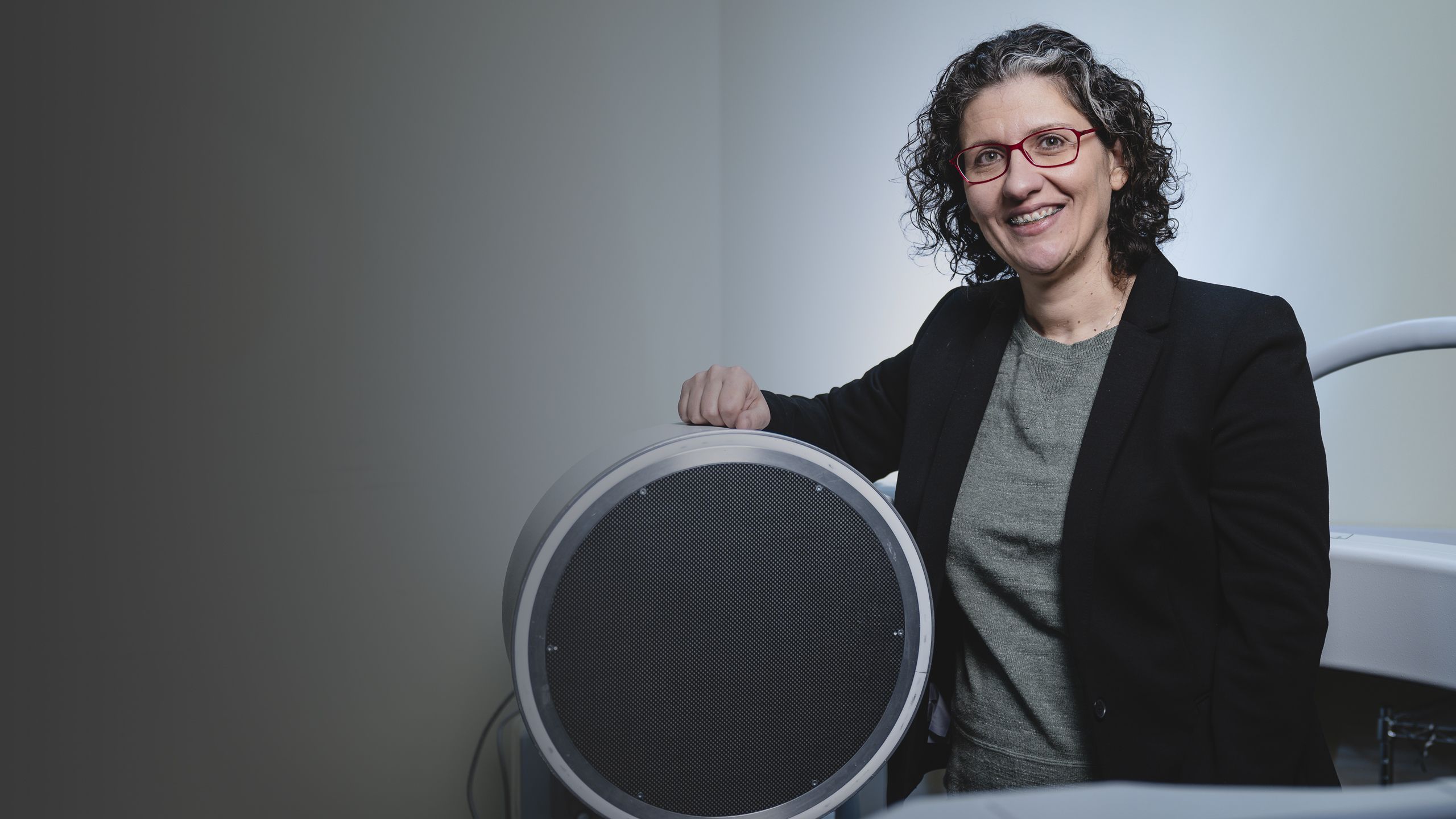A GIFT OF LOVE
// By Kat Braz (LA’01, MS LA’19)
// Photos by Charles Jischke (MBA’08)

Dave Greulich (ME’67) never realized he believed in love at first sight until he met Dee.
A friend fixed the couple up on a blind date in their hometown of Louisville, Kentucky, a few weeks before Greulich left for his freshman year at Purdue. Deanna Schneider was an aspiring nurse with a gentle disposition who exhibited great empathy and care for others. Greulich was smitten. The pair continued to date while attending separate colleges and married on January 27, 1968.
Their love story blossomed in Cincinnati, where Greulich accepted a position with a machine tool company. Dee’s nursing career flourished. They raised two daughters, Jennifer (A’93) and Christina. Greulich eventually joined his brother’s engineering consulting firm. The couple traveled frequently in retirement.
“We visited every state,” Greulich says. “We went on cruises to Europe, the Caribbean, Alaska—we saw the world together.”
On March 16, 2021, two months after their 53rd anniversary, Dee died. She had previously undergone multiple back surgeries as well as surgery on her neck. Her death was partly attributed to dysphagia, the medical term for difficulty swallowing. Dysphagia affects 10 million adults and more than half a million children in the United States every year.
“We first heard the term dysphagia about four weeks before Dee died,” Greulich says. “Although it was presented as a sudden onset condition, in retrospect, it was probably a long time developing. As an engineer, I’m a bit of a control freak, and it was the perfect storm of not having enough information about what was happening and feeling helpless to do anything about it.”
In the weeks following Dee’s death, Greulich sought to better understand the condition and how it can be managed. That’s when he discovered the work of Georgia Malandraki, professor of speech, language, and hearing sciences at Purdue and one of the world’s foremost experts on the research of dysphagia. Malandraki was in her native country of Greece, marking the one-year anniversary of her mother’s death, when she received notice that Greulich was interested in meeting with her. The two bonded immediately over their shared grief.
“I initially reached out to Georgia in hopes of deepening my understanding of the causes and treatments of dysphagia,” Greulich says. “I wanted answers to the questions that haunted me:
How did this happen?
What went wrong?
Was there something we could have done differently?
At first, I hoped to find a way to eliminate dysphagia as a manner of dying. Through Georgia’s efforts, I now understand the real challenge is to improve the quality of life for people living with dysphagia.”
Improving the lives of others was central to Dee’s personality and life’s work. For Greulich, establishing a memorial gift to support Malandraki’s Imaging, Evaluation, and Treatment (I-EaT) of Swallowing Research Lab felt like a perfect way to honor his beloved wife. He chose to make a gift of $150,000, disbursed in $30,000 increments through 2025, and establish an endowment with an initial gift of $25,000 to support student researchers.

“We first heard the term dysphagia about four weeks before Dee died,” Greulich says. “Although it was presented as a sudden onset condition, in retrospect, it was probably a long time developing. As an engineer, I’m a bit of a control freak, and it was the perfect storm of not having enough information about what was happening and feeling helpless to do anything about it.”
In the weeks following Dee’s death, Greulich sought to better understand the condition and how it can be managed. That’s when he discovered the work of Georgia Malandraki, professor of speech, language, and hearing sciences at Purdue and one of the world’s foremost experts on the research of dysphagia. Malandraki was in her native country of Greece, marking the one-year anniversary of her mother’s death, when she received notice that Greulich was interested in meeting with her. The two bonded immediately over their shared grief.
“I initially reached out to Georgia in hopes of deepening my understanding of the causes and treatments of dysphagia,” Greulich says. “I wanted answers to the questions that haunted me:
How did this happen?
What went wrong?
Was there something we could have done differently?
At first, I hoped to find a way to eliminate dysphagia as a manner of dying. Through Georgia’s efforts, I now understand the real challenge is to improve the quality of life for people living with dysphagia.”
Improving the lives of others was central to Dee’s personality and life’s work. For Greulich, establishing a memorial gift to support Malandraki’s Imaging, Evaluation, and Treatment (I-EaT) of Swallowing Research Lab felt like a perfect way to honor his beloved wife. He chose to make a gift of $150,000, disbursed in $30,000 increments through 2025, and establish an endowment with an initial gift of $25,000 to support student researchers.

“I FEEL GEORGIA IS PART OF MY FAMILY.
SHE HAS A CARING EMPATHY THAT REMINDS ME OF DEE.”


“I FEEL GEORGIA IS PART OF MY FAMILY. SHE HAS A CARING EMPATHY THAT REMINDS ME OF DEE.”


“Once I met Georgia, I was so impressed by her empathy and humanity when talking about how dysphagia affects a person,” Greulich says. “I spent years listening to medical professionals discussing Dee’s sickness separate from her personhood. The I-EaT Lab’s focus on the human dimension really struck me as significant.”
For Malandraki, the gift couldn’t have come at a better time. The I-EaT Lab had just finished up a three-year grant from the National Institutes of Health to develop an innovative wearable sensor technology for the evaluation and treatment of dysphagia using remote telehealth monitoring. Greulich’s donation enabled the team to manufacture standardized sensors and keep collecting data. Malandraki hopes to secure additional grant funding to launch a large clinical trial later this year.
“Dysphagia can be a very isolating condition,” Malandraki says. “Eating, drinking, and swallowing are integral to our well-being, both biologically and socially. For every occasion we gather—happy or sad—food and drinks are usually present. Some of our patients experience depression and are resistant to leave their homes because they fear stigma from not being able to engage in social events. I hope our research will provide evidence for the field on how to develop physiology-based interventions to treat these devastating disorders.”
It’s a vision Greulich shares, too—not only that the complications of dysphagia will be minimized for future patients but that Dee’s memory serves as a catalyst for others to give back.
“Dee and I believe that every person has an obligation to their fellow humankind to make life better, for as long as they are stewards of the gift of life,” Greulich says. “Our support of the I-EaT Lab is Dee’s departing gesture. I hope this gift honoring Dee inspires others to find their own ways to make life better for their fellow humankind.”
ABOUT THE I-EAT LAB
The Imaging, Evaluation, and Treatment of Swallowing Research Lab at Purdue is the only dysphagia research lab internationally that uses advanced technologies to examine all levels of swallowing function—from behavior and biomechanics to muscle and brain physiology—to develop guidance for personalized dysphagia treatments.

“Once I met Georgia, I was so impressed by her empathy and humanity when talking about how dysphagia affects a person,” Greulich says. “I spent years listening to medical professionals discussing Dee’s sickness separate from her personhood. The I-EaT Lab’s focus on the human dimension really struck me as significant.”
For Malandraki, the gift couldn’t have come at a better time. The I-EaT Lab had just finished up a three-year grant from the National Institutes of Health to develop an innovative wearable sensor technology for the evaluation and treatment of dysphagia using remote telehealth monitoring. Greulich’s donation enabled the team to manufacture standardized sensors and keep collecting data. Malandraki hopes to secure additional grant funding to launch a large clinical trial later this year.
“Dysphagia can be a very isolating condition,” Malandraki says. “Eating, drinking, and swallowing are integral to our well-being, both biologically and socially. For every occasion we gather—happy or sad—food and drinks are usually present. Some of our patients experience depression and are resistant to leave their homes because they fear stigma from not being able to engage in social events. I hope our research will provide evidence for the field on how to develop physiology-based interventions to treat these devastating disorders.”
It’s a vision Greulich shares, too—not only that the complications of dysphagia will be minimized for future patients but that Dee’s memory serves as a catalyst for others to give back.
“Dee and I believe that every person has an obligation to their fellow humankind to make life better, for as long as they are stewards of the gift of life,” Greulich says. “Our support of the I-EaT Lab is Dee’s departing gesture. I hope this gift honoring Dee inspires others to find their own ways to make life better for their fellow humankind.”
ABOUT THE I-EAT LAB
The Imaging, Evaluation, and Treatment of Swallowing Research Lab at Purdue is the only dysphagia research lab internationally that uses advanced technologies to examine all levels of swallowing function—from behavior and biomechanics to muscle and brain physiology—to develop guidance for personalized dysphagia treatments.

